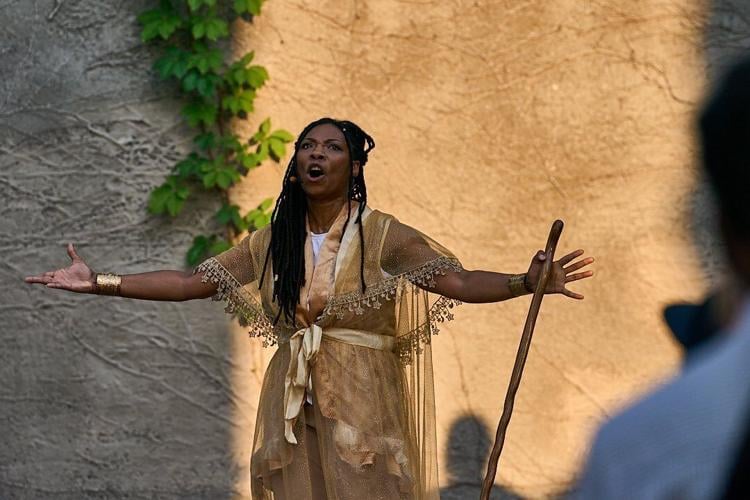ST. LOUIS ÔÇö Local arts organizations were staggered late Friday by the loss of funding from the National Endowment for the Arts, but many vow to continue their artistic missions ÔÇö if perhaps in a reduced capacity.
The organizations received a curt email Friday evening informing them that they would not be receiving the grants that had been recommended in January. The move is part of the Trump administrationÔÇÖs efforts to cut spending broadly across the government.
Locally, the grants ranged from $10,000 to $45,000 and had been promised to 14 area organizations.
The National Endowment for the Arts is a federal agency that awards grants to arts organizations around the country. The administrationÔÇÖs 2026 budget proposal calls for the elimination of funding for both the NEA and the National Endowment for the Humanities.
People are also reading…
Among the local organizations to lose funding this year are the International Institute of Metropolitan Ëú╠Ê╩ËãÁ, the Ëú╠Ê╩ËãÁ Shakespeare Festival, Cinema Ëú╠Ê╩ËãÁ, the Ëú╠Ê╩ËãÁ Black Repertory Company, the Ëú╠Ê╩ËãÁ Dance Theatre (formerly Big Muddy Dance Company), the Kranzberg Arts Foundation, Dance Ëú╠Ê╩ËãÁ, Big River Association (River Styx magazine), Dances of India, Ëú╠Ê╩ËãÁ Story Stitchers Artists Collective, Prison Performing Arts and an arts-related study at Webster University.
At least one arts organization was not affected by the cuts. The Ëú╠Ê╩ËãÁ Symphony Orchestra received its grant of $30,000 in February.
Erin Prange, executive director for Ëú╠Ê╩ËãÁ Dance Theatre, worries about the trickle-down effect the cuts will have, potentially diminishing the countryÔÇÖs support for the arts in general.
ÔÇ£WeÔÇÖre really calling on the community to make sure that everyone understands the importance of arts and culture to the identity of any city, state or country, and how important it actually is to our overall well-being as humans. All sort of things we take for granted everyday are created by artists,ÔÇØ she said.

The cast of the Black Rep's production of "The Wash." The company applied for a National Endowment for the Arts grant for the show, which it presented in March, but now the grant has been withdrawn.
The Ëú╠Ê╩ËãÁ Black Repertory Company was hit especially hard. It lost a $35,000 grant to produce Kelundra SmithÔÇÖs play, ÔÇ£The Wash,ÔÇØ which was already presented in March. And the organizationÔÇÖs educational fellows are paid through AmeriCorps, which the federal government also recently eliminated. Production artistic director Ron Himes estimated that the AmeriCorps loss was in the six figures for the Black Rep.
If they canÔÇÖt win the funding for the grant on appeal, the Black Rep will have to make adjustments next season, he said.
The grants are for specific programs for each organization, so the blow is generally not likely to be fatal, especially to the larger organizations. But the loss of funding may limit what they are able to do.
The Shakespeare FestivalÔÇÖs grant of $20,000 was going to cover the annual production of an abridged version of a Shakespeare play in area parks. The grant was also in support of Shakespeare in the Streets, which creates an original work inspired by a Ëú╠Ê╩ËãÁ neighborhood ÔÇö this year itÔÇÖs East Ëú╠Ê╩ËãÁ ÔÇö and a Shakespeare play.
ÔÇ£ItÔÇÖs a blow, and weÔÇÖll have to find a way to absorb it and replace it. But weÔÇÖre 100% committed to doing that,ÔÇØ said Tom Ridgley, the organizationÔÇÖs artistic producing director.
According to the email, the reason for withdrawing the funds was that the grants didnÔÇÖt fall under the administrationÔÇÖs priorities. It said the NEA now prioritizes projects that celebrate the nationÔÇÖs 250th anniversary, elevates Historically Black Colleges and Universities or Hispanic serving institutions, foster AI competence, help religious organizations serve communities, assist in disaster recovery, make America healthy again and make the District of Columbia safe and beautiful, among others.
Bree Maniscalco, executive director of Cinema Ëú╠Ê╩ËãÁ, said that many of these priorities have little to do with art.
Cinema Ëú╠Ê╩ËãÁ was due to receive $20,000 to help fund it the annual Ëú╠Ê╩ËãÁ International Film Festival. She said the grant represented about 12% of that festivalÔÇÖs budget.
ÔÇ£WeÔÇÖre going to have to make some smart, creative, behind-the-scenes adjustments to stretch the dollars,ÔÇØ she said.
ÔÇ£We learned how to pivot during COVID, and itÔÇÖs made us find ways to reach audiences while there are restrictions.ÔÇØ

Keenan Fletcher in ÔÇ£The CallingÔÇØ by Jessica Lang at Ëú╠Ê╩ËãÁ Dance Theatre
Ëú╠Ê╩ËãÁ Dance TheatreÔÇÖs Prange said the move was baffling.
ÔÇ£We applied for the grant a year a half ago under completely different priorities, under a completely different administration,ÔÇØ she said. ÔÇ£Of course it didnÔÇÖt follow these (new) priorities.ÔÇØ
Ridgley said that if the festival had a project that fell under these priorities it would apply to the NEA again.
ÔÇ£But itÔÇÖs tricky. ThatÔÇÖs exactly the kind of tail-wagging-the-dog (situation) that you donÔÇÖt want to get in the habit of, where youÔÇÖre letting a funderÔÇÖs given priorities dictate the programs that you do.ÔÇØ
The email from the NEA leaves open the possibility of an appeal, and some of the local organizations are planning to try that option. Chris Hansen, executive director of the Kranzberg Arts Foundation, said he believes he can show how the foundationÔÇÖs Music at the Intersection event, which was scheduled to receive a $20,000 grant, aligns with the endowmentÔÇÖs new priorities.

The Missouri River Cloggers, from left, Kim Porter, April Eller and Ruth Zerface, open the entertainment portion of the Festival of Nations on Saturday, Aug. 27, 2022.
David Gonzales, vice president of development for the International Institute of Metropolitan Ëú╠Ê╩ËãÁ, said he thinks he can prove that the organizationÔÇÖs signature event, the Festival of Nations, supports the economic development of Asian-American communities, which is one of the listed priorities.
The International Institute was already suffering under Trump administration policies. In February, it put more than 60% of its statewide staff on furlough after the administration halted immigration and refugee programs.
Because of that decrease in staff, the Festival of Nations celebration was initially in doubt. The event, which brings 100,000 people to Tower Grove Park for two days of food, music and dance from 75 countries around the world, was slated to receive a grant of $30,000 this year.
ÔÇ£When we were trying to make our decision in March of this year, the fact that we would have this $30,000 was a huge factor in planning for the event,ÔÇØ Gonzales said.
The institute plans to go ahead with the Festival of Nations even if it does not win its appeal, he said. The money the restaurants receive from it ÔÇö and to a lesser extent the music and dance troupes ÔÇö can make the difference between a year with a profit or a year with a loss, he said.
The areaÔÇÖs largest grant, $45,000, which was awarded to Webster University, was also rescinded. The money was meant for a study to look into how racial inequities impact the lives of young Black artists. Jong Bum Kwon, interim chair of the Department of Global Languages, Cultures and Societies, said he plans to appeal the decision.
ÔÇ£I donÔÇÖt expect the appeal to change the administrationÔÇÖs decision, but I do want to put on record that the project has value, not only for young Black creatives in the region but also for the regionÔÇÖs economic growth,ÔÇØ he said.
The $15,000 that the River Styx literary magazine was set to receive would have helped them produce an issue of the magazine and to digitize past issues. The NEA has funded the 49-year-old institution for decades, and this cut came in the middle of its fiscal year, said managing editor Bryan Castille.
ÔÇ£WeÔÇÖre struggling to understand the ramifications of what that means for our organization. The short answer is that weÔÇÖre in a much more troubling financial position than we were a week ago,ÔÇØ he said.
ÔÇ£Arts funding shouldnÔÇÖt be a partisan issue,ÔÇØ Castille said. ÔÇ£This is a mistake.ÔÇØ
Dance Ëú╠Ê╩ËãÁ was scheduled to receive $20,000 to support a dance education program for young people.
The organizationÔÇÖs artistic director, Michael Uthoff, said: ÔÇ£This will have far-reaching consequences. It doesnÔÇÖt matter if the amount was large or small. You will have to find the money from somewhere else, and right now isnÔÇÖt a good environment for fundraising.ÔÇØ
Young people were also the focus of a $30,000 grant that had been directed to the St. Lous Story Stitchers Artists Collective. The money was to support StitchCast Studio, a program that brings professional artists together with people 16 to 25 years old to teach them how to create podcasts.
ÔÇ£It works to combat inner-city issues through artistic expression,ÔÇØ said Branden Louis, the organizationÔÇÖs youth arts coordinator.
ÔÇ£Podcasts help with healthy expression and public speaking.ÔÇØ
The organization typically works through public performances of music, poetry and other arts, but it moved to podcasts when public performances were shut down during the COVID pandemic. Now, podcasts are its most popular function. Some of the people who have gone through the program have gone on to create their own podcasts, Lewis said.
ÔÇ£We wonÔÇÖt have to stop completely, but it will definitely be harder to get the funds,ÔÇØ he said.
Indian dance was a part of the 2022 Festival of Nations.













